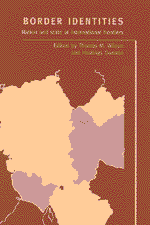Book contents
- Frontmatter
- Contents
- List of maps
- List of contributors
- Acknowledgements
- 1 Nation, state and identity at international borders
- 2 State formation and national identity in the Catalan borderlands during the eighteenth and nineteenth centuries
- 3 A western perspective on an eastern interpretation of where north meets south: Pyrenean borderland cultures
- 4 The ‘new immigration’ and the transformation of the European-African frontier
- 5 Transnationalism in California and Mexico at the end of empire
- 6 National identity on the frontier: Palestinians in the Israeli education system
- 7 Grenzregime (border regime): the Wall and its aftermath
- 8 Transcending the state? gender and borderline constructions of citizenship in Zimbabwe
- 9 Borders, boundaries, tradition and state on the Malaysian periphery
- 10 Markets, morality and modernity in north-east Turkey
- 11 Imagining ‘the South’: hybridity, heterotopias and Arabesk on the Turkish–Syrian border
- Author index
- Subject index
9 - Borders, boundaries, tradition and state on the Malaysian periphery
Published online by Cambridge University Press: 02 December 2009
- Frontmatter
- Contents
- List of maps
- List of contributors
- Acknowledgements
- 1 Nation, state and identity at international borders
- 2 State formation and national identity in the Catalan borderlands during the eighteenth and nineteenth centuries
- 3 A western perspective on an eastern interpretation of where north meets south: Pyrenean borderland cultures
- 4 The ‘new immigration’ and the transformation of the European-African frontier
- 5 Transnationalism in California and Mexico at the end of empire
- 6 National identity on the frontier: Palestinians in the Israeli education system
- 7 Grenzregime (border regime): the Wall and its aftermath
- 8 Transcending the state? gender and borderline constructions of citizenship in Zimbabwe
- 9 Borders, boundaries, tradition and state on the Malaysian periphery
- 10 Markets, morality and modernity in north-east Turkey
- 11 Imagining ‘the South’: hybridity, heterotopias and Arabesk on the Turkish–Syrian border
- Author index
- Subject index
Summary
One of the more embarrassing memories from my fieldwork on the island of Langkawi concerns a trip that my relatives in the village of Sungai Cantik planned to make by fishing boat across the border to southern Thailand. Pulau Langkawi forms part of the northern Malay state of Kedah. It lies off the west coast of the Malay peninsula, just south of the border between Malaysia and Thailand. The purpose of the trip was to do some cheap shopping, to visit friends and relatives, and to stay for a few days of enjoyment before returning loaded up with bargain Thai merchandise. The excursion was planned with considerable excitement – this was an out of the ordinary event, although not altogether unheard of – and I was invited to go along. Without thinking too hard about what might be involved, I accepted.
In the following days, doubts about the trip itself – on an overcrowded fishing boat – were reinforced by doubts of a more bureaucratic kind. Were there risks involved? What about my status as a foreign researcher if we were apprehended without proper documentation – visas, licences, passports? I demurred at the last moment, on the pretext of feeling unwell. The puzzlement and disappointment of my relatives, and particularly my foster mother's look of scepticism over my supposed illness, still bring back a sense of embarrassment and inadequacy undoubtedly recognisable to most anthropological fieldworkers.
- Type
- Chapter
- Information
- Border IdentitiesNation and State at International Frontiers, pp. 215 - 236Publisher: Cambridge University PressPrint publication year: 1998
- 1
- Cited by



